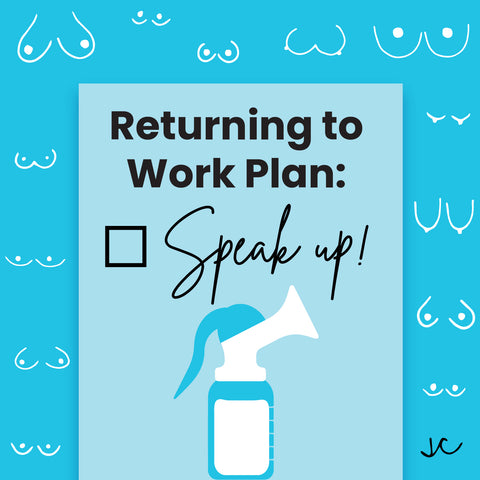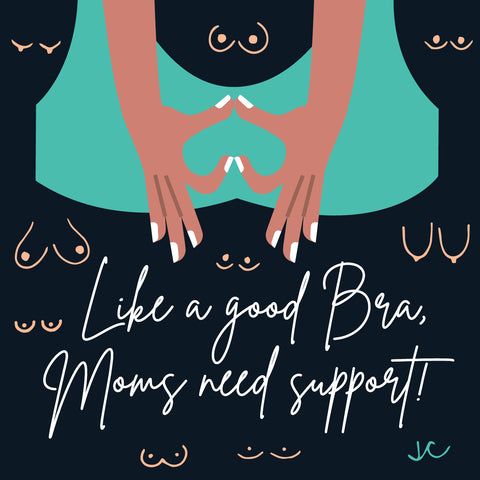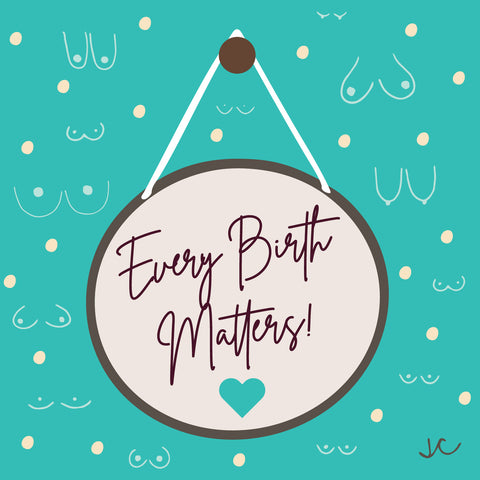How to Prepare for Postpartum and Why it’s important

Estimated read time: 16 minutes
When you're pregnant, instead of resting and taking it easy, you seem to spend your days planning.
Your babymoon, the birth, care plans for older children (if you have them), maternity leave, baby-proofing, organizing your baby register, whether you plan to breast or bottle feed, planning out the nursery…it never seems to end!
But the most important thing to plan mama is life postpartum.
Because, dang. It can be a rollercoaster.
In today’s culture, it’s very common to prioritize the needs of the baby over the needs of the new mom. And this can be attributed to not just a lack of awareness of the postpartum period, but it can contribute to mental health issues such as baby blues and postpartum depression.
So, let’s look at how to prepare for postpartum and why it’s so important.
What is the postpartum period?
Here’s the thing mama.
When we’re pregnant, we are bombarded with information about pregnancy. The different stages and trimesters, what to look out for, what the birth will be like, and, sometimes, how to care for your newborn.
BUT.
When it comes to life postpartum, we’re basically left in the dark.
In fact, a recent survey of 394 moms in the US showed that over half felt completely unprepared for what to expect and how to care for themselves in those first six weeks post-birth. And a jaw-dropping two-thirds felt that the postpartum period was way harder than they thought it would be.
So, what is the postpartum period anyway?
It starts the moment your little one is born and lasts for about six weeks. This time period is also known as the fourth trimester, and it’s a super important time - both for your newborn and you.
Women experience a heck of a lot of changes in those six weeks. Your emotions will be all over the place (happy one moment, crying for no apparent reason the next), you’ll have physical changes, plus you’ll be recovering from giving birth.
The first few days after giving birth, you can experience a number of physical changes. These can include vaginal bleeding, contractions (also known as ‘afterbirth pains), perineal pain, pain when you pee, constipation, swollen breasts, swollen legs and feet, and tiredness…and that’s just a few of the changes.
As the weeks go on, it’s also normal to experience hair loss, sweating, fatigue, stretch marks, incontinence, and even hemorrhoids.
And when it comes to emotions and mental health, you could experience the all-too-common baby blues. This is when you feel a sense of sadness after giving birth. As many as 80% of women report feeling like this during this time, so it’s a lot more common than we’re led to believe. These feelings tend to go away after a few days or a couple of weeks, but if they don’t, or the feelings become more intense, then it’s possible you’re suffering from postpartum depression.
Then there’s the first time you have sex after giving birth, you’re first postpartum period, and the potential struggles of breastfeeding.
Ways to prepare for postpartum
With all this in mind, being prepared for life postpartum can make a huge difference to your physical and mental health. Knowing what could happen and being prepared for it is like having a support army by your side.
Here are 7 ways to help you prepare for the first six weeks postpartum:
1. Lactation support
If you are planning to breastfeed, then having lactation support is essential.
Take it from our founder Jessy, who received no support during her early breastfeeding days (thanks Covid), and had to figure out her journey alone.
Breastfeeding is beautiful. And it’s natural. But that doesn’t mean it’s easy mama. So many women struggle to breastfeed, whether it’s down to a low supply, overproduction, latching issues, tongue-tie, positioning issues, fear of feeding in public… the list goes on and on.
This is why it’s super important to line up lactation support during your pregnancy, so you have the help available if and when you need it. Spend some time researching local lactation consultants to have on hand and arrange some phone calls or meetings so you can discuss your breastfeeding plan and what to do if you need help.
2. Meal plan and food prep
The first thing most people do when there’s a new baby is bring over a meal for the family. This is super helpful, but you don’t want to have to rely on it. You also don’t want to be worrying about what to cook for dinner when you’re juggling a newborn.
This is where meal planning and food prep come in. Speak to your Breasties and ask if they can organize a food train. This way meals will be scheduled and brought over, without you even having to think about it.
While you’re in the nesting stage of your pregnancy, do some bulk shopping and batch-cook as many meals as you can. Stash them in the freezer with the name of the meal and the date you cooked it. This way, you’ll have plenty of homecooked meals ready to defrost, saving you from having to order takeout every night!
3. Create a help list
When you’re dealing with a newborn and recovering from birth, it’s very easy to put your basic needs aside. And “mommy brain” is a very real thing. To save yourself time and stress, put together a list of professional and medical help while you’re pregnant.
On this list, put the phone numbers of everyone from your little one’s pediatrician, your doctor, the lactation consultant you choose, local support groups, and even your favorite takeout numbers. Keep the list in an easy-to-reach place so you can refer to it anytime you need help and don’t have the time or energy to spend Googling someone.
4. Research a postpartum doula and night nurse
Here’s the thing. You might never need to use a doula or a night nurse, but it’s sensible having names and numbers on file in case you decide you do want one.
As great a help as family and Breasties are, you might find it difficult to keep asking for help. Or you might live miles away from your family. If you find you’re struggling, never do it alone. Have a look at your budget while you’re pregnant and research the costs of hiring a postpartum doula or night nurse.
Having a professional with you through the toughest days (and nights) can be a real blessing.
5. Prepare a recovery kit
Whether you have a vaginal birth or a c-section, recovery from birth is hard. Your body has just made and carried an entire human. Pregnancy can be hard enough, and birth can go any which way. Even the most straightforward births require time to heal and recover.
The first few days after giving birth are tough. With postpartum bleeding, pain relief, potential stitches, c-section wounds, lack of sleep, and establishing breastfeeding, your postpartum body needs a lot of love and care.
Preparing a postpartum recovery kit is a great way to look after yourself, no matter what kind of birth you have. And if you end up not using some of the stuff in your kit, you can save them for another time (if there is another time), give them to a friend, or even donate them to a woman’s shelter.
Here are some things you can include:
- Maternity pads - these large, thick pads are specially designed to handle the heavy flow of postpartum bleeding. Invest in several packs to make sure you always have plenty on hand.
- Large, comfy panties - opt for dark colors a couple of sizes larger than your usual size. You can also get c-section underwear designed to sit above your scar, but regular ol’ granny panties should do just fine.
- Budget-friendly bedding - buy yourself a couple of sets of inexpensive, dark-colored bedding to have on your bed for the first few weeks. With postpartum bleeding, hormone shakes (those night sweats are the worst!) diaper explosions, and spit-up, you won’t mind ruining these sheets and saving your favorites for when things settle down a bit.
- A squirt (peri) bottle - if you’re feeling sore post birth then these bottles are great. Fill them with warm water and gently squeeze to release a stream of water over your perineum while going to the bathroom. The water makes peeing a little easier and cleanses the area to prevent infection.
- Pain medication - your hospital might send you home with pain medication, but it’s a good idea to stock up on over-the-counter painkillers too.
- Ice packs - ice helps decrease pain and swelling, helping you feel a little better down there. There are lots of ice packs available, from chemically activated to disposable.
- Healthy snacks and drinks - it’s so easy to just snack on all the junk you can get your hands on. And while, yes, you deserve some treats, filling up on healthy foods will help your body heal and keep your energy up. Look for food high in fiber too to help keep your bowel movements regular.
- Stool softener - if you had a c-section, the anesthesia and painkillers can cause constipation. Speak to your doctor or pharmacist to see which stool softeners would be suitable to take if you need them.
- Comfy, loose clothing - whether you have a c-section or a vaginal birth, you’ll want to wear super soft, comfy clothing for the first few weeks. If you’re planning on breastfeeding, look for breastfeeding-friendly tops to make it easier to whip a Titty out.
- Nursing bras - non-wired bras with easy access to your beautiful Boobies are a must if you’re planning on nursing. Make sure you get properly fitted.
- Breast pads - even if you don’t plan to breastfeed, all new mamas make milk! Breast pads will help keep leaking Boobies under control.
- Nipple cream - Woah mama! Those nipples can get crazy sore when feeding your little milk monster. Keep your nips in top condition with a good quality nipple cream.
6. Arrange help and support
If you have a support system of friends and family around you, then use them! Before giving birth, speak to your network and ask for specific help. That could be assisting with childcare for older children, preparing a few meals, helping out with some housework, or being there with the baby so you can have a shower and a nap.
We know it’s tough to ask for help. Women are crazy strong, and asking for help isn’t easy. But this is a time when you need it. And people are only too happy to step up if you ask them.
7. Prioritize rest
In the old days, they used to have “lying in” periods after giving birth. This was a time when women could just rest in bed with their new baby for a few weeks and concentrate on resting, feeding, and bonding.
In today’s modern world, this extremely sensible idea hardly ever happens (can we bring it back please?!) Because during the immediate postpartum period, rest is essential. The reason you prepare for postpartum is so that the time after giving birth is spent resting and caring for yourself and your baby.
You need to recover from pregnancy and birth. Your body will be working hard trying to heal itself AND produce milk. Make sure your friends, family, and partner understand how important this healing process is and how vital it is for you to stay in bed and rest.
You can make things clear while pregnant that certain boundaries need to be set. This can include no visitors for the first couple of weeks, set visiting hours, and rules about holding your baby. We know the conversations might be tough, but it’s a lot easier to have them before giving birth when you mentally might not be up for it.
The postpartum period can be hard, mama
But we are here for you every step of the way. Just remember how amazing and strong you are.
It’s important not to make too many assumptions about what your postpartum will be like, but it’s always a good idea to plan ahead, so the help and support are there if you need it.
You are never alone. Reach out to friends and family and never be afraid to ask for help. Everyone is here to love and support you. Including us Breastie. You’ve got this.
At Titty City Design, we believe that every boobie is beautiful, and that should be celebrated. We are a female-owned and operated, small business here to spread self-love and body positivity with our line of boob apparel, boob accessories, and boob-themed decor and products for the home. A portion of our proceeds goes to help support postpartum people and breast cancer patients.
Products that Breastfeeding Moms Love







